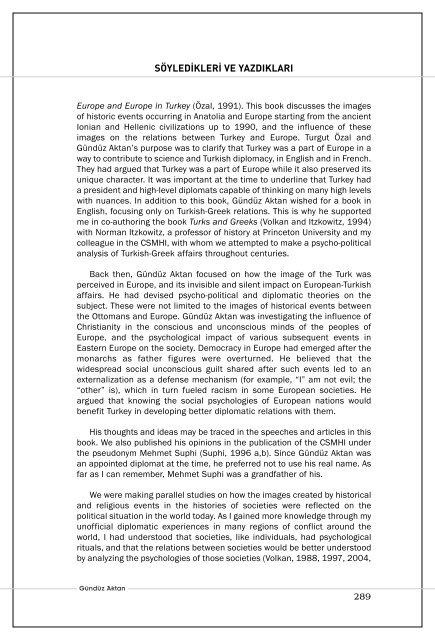gunduz-aktan-kitap-soyledikleri-ve-yazdiklari
gunduz-aktan-kitap-soyledikleri-ve-yazdiklari
gunduz-aktan-kitap-soyledikleri-ve-yazdiklari
You also want an ePaper? Increase the reach of your titles
YUMPU automatically turns print PDFs into web optimized ePapers that Google loves.
SÖYLEDİKLERİ VE YAZDIKLARI<br />
Europe and Europe in Turkey (Özal, 1991). This book discusses the images<br />
of historic e<strong>ve</strong>nts occurring in Anatolia and Europe starting from the ancient<br />
Ionian and Hellenic civilizations up to 1990, and the influence of these<br />
images on the relations between Turkey and Europe. Turgut Özal and<br />
Gündüz Aktan’s purpose was to clarify that Turkey was a part of Europe in a<br />
way to contribute to science and Turkish diplomacy, in English and in French.<br />
They had argued that Turkey was a part of Europe while it also preser<strong>ve</strong>d its<br />
unique character. It was important at the time to underline that Turkey had<br />
a president and high-le<strong>ve</strong>l diplomats capable of thinking on many high le<strong>ve</strong>ls<br />
with nuances. In addition to this book, Gündüz Aktan wished for a book in<br />
English, focusing only on Turkish-Greek relations. This is why he supported<br />
me in co-authoring the book Turks and Greeks (Volkan and Itzkowitz, 1994)<br />
with Norman Itzkowitz, a professor of history at Princeton Uni<strong>ve</strong>rsity and my<br />
colleague in the CSMHI, with whom we attempted to make a psycho-political<br />
analysis of Turkish-Greek affairs throughout centuries.<br />
Back then, Gündüz Aktan focused on how the image of the Turk was<br />
percei<strong>ve</strong>d in Europe, and its invisible and silent impact on European-Turkish<br />
affairs. He had devised psycho-political and diplomatic theories on the<br />
subject. These were not limited to the images of historical e<strong>ve</strong>nts between<br />
the Ottomans and Europe. Gündüz Aktan was in<strong>ve</strong>stigating the influence of<br />
Christianity in the conscious and unconscious minds of the peoples of<br />
Europe, and the psychological impact of various subsequent e<strong>ve</strong>nts in<br />
Eastern Europe on the society. Democracy in Europe had emerged after the<br />
monarchs as father figures were o<strong>ve</strong>rturned. He belie<strong>ve</strong>d that the<br />
widespread social unconscious guilt shared after such e<strong>ve</strong>nts led to an<br />
externalization as a defense mechanism (for example, “I” am not evil; the<br />
“other” is), which in turn fueled racism in some European societies. He<br />
argued that knowing the social psychologies of European nations would<br />
benefit Turkey in de<strong>ve</strong>loping better diplomatic relations with them.<br />
His thoughts and ideas may be traced in the speeches and articles in this<br />
book. We also published his opinions in the publication of the CSMHI under<br />
the pseudonym Mehmet Suphi (Suphi, 1996 a,b). Since Gündüz Aktan was<br />
an appointed diplomat at the time, he preferred not to use his real name. As<br />
far as I can remember, Mehmet Suphi was a grandfather of his.<br />
We were making parallel studies on how the images created by historical<br />
and religious e<strong>ve</strong>nts in the histories of societies were reflected on the<br />
political situation in the world today. As I gained more knowledge through my<br />
unofficial diplomatic experiences in many regions of conflict around the<br />
world, I had understood that societies, like individuals, had psychological<br />
rituals, and that the relations between societies would be better understood<br />
by analyzing the psychologies of those societies (Volkan, 1988, 1997, 2004,<br />
Gündüz Aktan<br />
289



